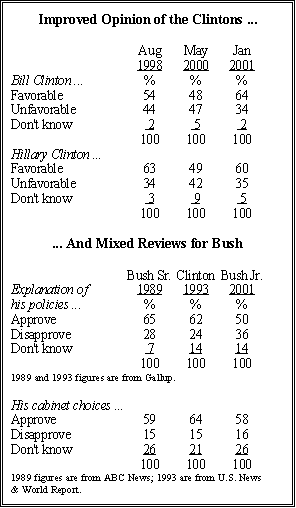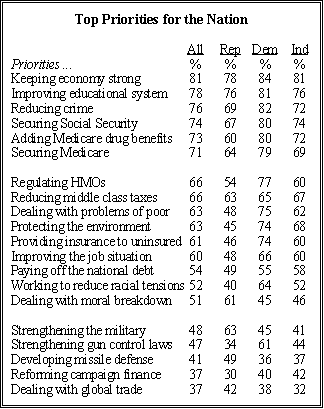Introduction and Summary
As the country awaits the formal transfer of presidential power, Bill Clinton has never looked better to the American public, while his successor George W. Bush is receiving initial reviews that are more mixed, though still positive. The president leaves office with 61% of the public approving of the way he is handling the job, combined with a surprisingly lofty 64% favorability rating (up from 48% in May 2000). The favorability rating, a mixture of personal and performance evaluations, is all the more impressive because such judgments have never been Clinton’s strong suit. Unlike other recent presidents, Clinton’s ratings have often run below his job approval scores.
 As historians and scholars render their judgments of Clinton’s legacy, the public is weighing in with a nuanced verdict. By a 60%-27% margin, people feel that, in the long run, Clinton’s accomplishments in office will outweigh his failures, even though 67% think he will be remembered for impeachment and the scandals, not for what he achieved. At the same time, evaluations of Hillary Clinton are on the upswing as she leaves the White House to become New York’s junior senator.
As historians and scholars render their judgments of Clinton’s legacy, the public is weighing in with a nuanced verdict. By a 60%-27% margin, people feel that, in the long run, Clinton’s accomplishments in office will outweigh his failures, even though 67% think he will be remembered for impeachment and the scandals, not for what he achieved. At the same time, evaluations of Hillary Clinton are on the upswing as she leaves the White House to become New York’s junior senator.
Opinions of President-elect Bush are notably less effusive, which may be at least partly attributable to the election’s contentious conclusion. A 50% plurality approves of the job he has done in explaining his policies and plans for the future. This contrasts to 62% who expressed that view of Clinton in a Pew Research Center survey in January 1993, and 65% who approved of George Bush Sr.’s policy explanations in a Gallup Poll twelve years ago.
Partisan hostility explains Bush’s lower ratings as only 29% of Democrats and independents who lean Democratic approve of the job the president-elect has done in communicating his plans. In contrast, Republicans and independents who lean to the GOP were far more positive toward Clinton in 1993, when 43% approved of his initial policy presentations.
Bush gets somewhat higher grades for his cabinet selections (58% approval).[1. The survey was fielded before Linda Chavez withdrew her name as Bush’s nominee for Secretary of Labor.] While these ratings are lower than Clinton’s, they are comparable to his father’s and better than the ratings Ronald Reagan’s cabinet received in 1981. Further, the Pew survey, which was conducted among a national sample of 1,258 adults Jan. 3-7, found that relatively few people (21%) believe his cabinet picks and other high-level appointments are too conservative; half think they are about right ideologically. The selection of Colin Powell may have a lot to do with this, as 33% were able to identify the retired general as a member of the new cabinet — a much higher number than could recall the name of any Clinton nominee in 1993.
By a 56% to 29% margin, Americans think it is a good thing that many of Bush’s top advisors worked in his father’s administration. In that regard only 12% think that Dick Cheney is playing too large a role in the new administration. Even at this early stage, 31% think Cheney will be a successful vice president — a somewhat higher number than those who think Bush will be a successful president.
 Flagging economic optimism may be one of the first problems confronting the new administration. There has been a significant increase in the number of Americans who expect to be worse off financially over the course of the year: 27% express that view now, compared to about 10% in January 1999. In fact, the economic expectations voiced in the current survey are the least positive on this measure since 1992, when Clinton was campaigning for office on a promise to jump-start the economy. Similarly, public interest in stories about the economy and financial conditions is as high as it has been since 1994, when many people still believed the economy was in a recession.
Flagging economic optimism may be one of the first problems confronting the new administration. There has been a significant increase in the number of Americans who expect to be worse off financially over the course of the year: 27% express that view now, compared to about 10% in January 1999. In fact, the economic expectations voiced in the current survey are the least positive on this measure since 1992, when Clinton was campaigning for office on a promise to jump-start the economy. Similarly, public interest in stories about the economy and financial conditions is as high as it has been since 1994, when many people still believed the economy was in a recession.
Not surprisingly, the state of the economy has gained importance in the eyes of the public. More than eight-in-ten (81%) rate keeping the economy strong as the leading priority for the president and Congress. While partisan divisions persist in the wake of the election, Republicans, Democrats and independents agree that maintaining strong economic growth should be Washington’s first order of business.
Partisan tensions are apparent in public perceptions of which groups will thrive and which ones will lose ground in the Bush years. Majorities think that business corporations, the military and Christian conservatives will gain in influence, while pluralities think feminists, poor people, environmentalists, and union leaders will wane in influence. Already, Bush himself is seen as tilting to the right; by 48%-37%, the public thinks the new president is listening more to the conservatives than the moderates in his party.
Priorities for ’01
Perhaps not surprisingly, given the public’s growing financial concerns, keeping the economy strong has overtaken education as the public’s leading policy priority. Improving education, which led the list of priorities last year, is now second.
 As Bush prepares to begin his presidency, there are notable areas of bipartisan agreement, although vast differences continue to divide the parties. Aside from the economy, Republicans, Democrats and independents all rate improving education, reducing crime, and securing Social Security and Medicare very highly. In addition, a strong consensus has emerged in favor of a middle-class tax cut, with better than six-in-ten in each group calling tax cuts a top priority.
As Bush prepares to begin his presidency, there are notable areas of bipartisan agreement, although vast differences continue to divide the parties. Aside from the economy, Republicans, Democrats and independents all rate improving education, reducing crime, and securing Social Security and Medicare very highly. In addition, a strong consensus has emerged in favor of a middle-class tax cut, with better than six-in-ten in each group calling tax cuts a top priority.
But Republicans and Democrats are far apart on the importance of a wide range of issues, including protecting the environment, gun control, health care, strengthening the military and improving the nation’s moral climate. Almost three-quarters of Democrats and nearly as many independents (68%) rate the environment as a top priority; less than half of Republicans (45%) agree. Democrats are also far more likely than Republicans to regard providing insurance for the uninsured and toughening gun control laws as major priorities.
Conversely, Republicans attach greater importance to building up the military and dealing with the nation’s moral breakdown. Better than six-in-ten Republicans see those issues as leading priorities, compared to fewer than half of Democrats and independents. Republicans are also more likely than Democrats to view missile defense as a top priority; still, only about half (49%) of Republicans see this as very important.
There also is a gender gap over the nation’s priorities, although men and women alike place the economy and education at the top of the list. Women are far more likely to rate insuring the uninsured (68% vs. 53% of men), improving the job situation (65% vs. 53%) and helping the poor and needy (69% vs. 58%) as top priorities. Strengthening the armed forces ranks as more important for men than it does for women (53%-42%).


